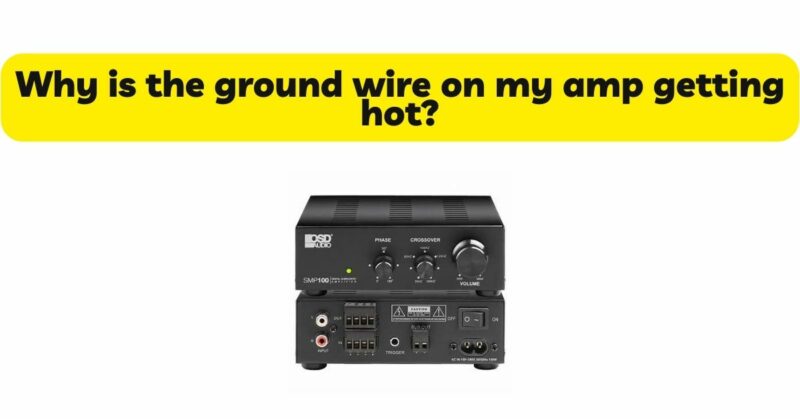Discovering that the ground wire on your amplifier is getting hot can be a cause for concern. A ground wire plays a vital role in electrical systems, providing safety and stability. When it becomes excessively hot, it suggests an underlying issue that requires attention. In this article, we will explore the potential reasons why the ground wire on your amp is getting hot. We will discuss common causes such as excessive current flow, inadequate wire gauge, faulty connections, and component issues. By understanding these factors, you will be better equipped to diagnose and address the problem, ensuring the safety and optimal performance of your amplifier.
Understanding the Ground Wire in Amplifiers
The ground wire in an amplifier serves multiple functions:
- Electrical Safety: The ground wire provides a path for electrical current to flow safely in the event of a fault, such as a short circuit. It helps prevent electric shocks and protects both the equipment and individuals.
- Signal Ground: The ground wire establishes a reference point for audio signals, minimizing noise, hum, and interference.
Common Causes of a Hot Ground Wire
- Excessive Current Flow: One of the primary reasons for a hot ground wire is excessive current flow. This can occur due to an overload on the amplifier, such as driving it beyond its rated capacity or using it with speakers that have low impedance. When the current exceeds the capacity of the wire, it generates heat.
- Inadequate Wire Gauge: The wire gauge (thickness) should be appropriate for the current flow in the system. If the wire gauge is too small for the current being carried, it can lead to increased resistance, resulting in heat buildup. Using an insufficiently sized ground wire can cause it to heat up.
- Faulty Connections: Poor or loose connections between the ground wire and the amplifier, power source, or other components can create resistance and cause heat to accumulate. It is crucial to ensure that all connections are secure, clean, and properly tightened to minimize resistance and heat generation.
- Component Issues: Faulty components within the amplifier can also contribute to a hot ground wire. For example, a malfunctioning power supply or a damaged internal circuit can lead to abnormal current flow or increased resistance, resulting in heat buildup. In such cases, professional repair or replacement of the faulty component may be necessary.
Addressing the Hot Ground Wire Issue
- Evaluate Current Flow: Check if the amplifier is being driven within its rated capacity and if the speakers are compatible in terms of impedance. If necessary, adjust the audio settings to prevent excessive current flow.
- Upgrade Wire Gauge: Assess the wire gauge of the ground wire and ensure it is suitable for the current flow in your amplifier setup. Consult a professional or refer to wire gauge charts to determine the appropriate wire size.
- Verify Connections: Inspect all connections involving the ground wire, including the amplifier, power source, and other components. Ensure they are secure, clean, and properly tightened. Replace any damaged or corroded connectors if necessary.
- Consider Grounding Techniques: Implement proper grounding techniques, such as using dedicated grounding rods or conducting separate ground wires to eliminate ground loops and minimize resistance.
- Seek Professional Assistance: If the issue persists or if you are unsure about troubleshooting the problem yourself, it is advisable to consult a professional audio technician or electrician. They can analyze the amplifier and its components, diagnose the underlying issue accurately, and provide appropriate solutions.
Preventing Future Issues
To prevent the ground wire from getting hot in the future, consider the following measures:
- Follow Manufacturer Guidelines: Adhere to the manufacturer’s guidelines regarding amplifier usage, including recommended load impedance, power ratings, and operating conditions.
- Perform Regular Maintenance: Routinely inspect the amplifier, checking for any signs of damage or component issues. Clean the amplifier and its connections to remove dust and debris that may impact performance.
- Invest in Quality Equipment: Choose amplifiers and audio components from reputable brands known for their reliability and performance. High-quality equipment is less likely to encounter issues that could lead to a hot ground wire.
- Educate Yourself: Enhance your understanding of audio systems, grounding principles, and safe operating practices. This knowledge will empower you to identify potential issues and take appropriate preventive measures.
Conclusion
A hot ground wire in an amplifier is a symptom of an underlying problem that requires attention. Excessive current flow, inadequate wire gauge, faulty connections, and component issues are common causes of a hot ground wire. By evaluating current flow, ensuring appropriate wire gauge, verifying connections, and seeking professional assistance when needed, you can effectively address the issue. Remember to follow manufacturer guidelines, perform regular maintenance, and invest in quality equipment to prevent future problems. By prioritizing the safety and optimal performance of your amplifier, you can enjoy a high-quality audio experience for years to come.


